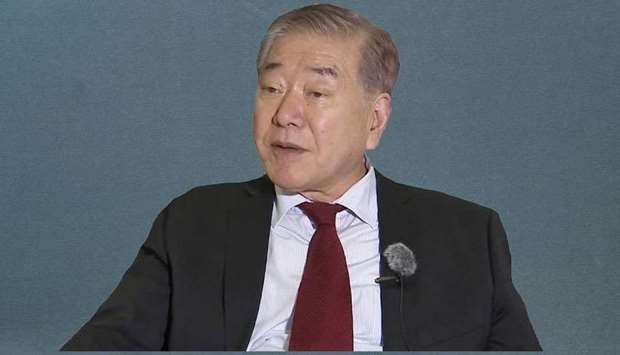The United States should seek the gradual denuclearisation of North Korea because an "all-or-nothing" strategy will not help break an impasse in talks, a special adviser to South Korea's president said on Tuesday.
US President Donald Trump and North Korean leader Kim Jong Un held their second summit last month on US demands that North Korea dismantle its nuclear programme in exchange for security guarantees and the lifting of sanctions.
But the talks in Vietnam broke down without agreement, although the two leaders parted on good terms.
Moon Chung in, a special national security adviser to South Korea's President Moon Jae-in, said both sides were to blame for the breakdown, but the United States appeared to have suddenly toughened its stand and called for North Korea's complete denuclearisation despite earlier suggestions it might agree to a phased approach.
"The United States made excessive demands on North Korea to reach a big deal, whereas Chairman Kim was overconfident that he could persuade Trump to get what he wants for closing down the Yongbyon main nuclear complex," Moon Chung-in said.
Moon pointed to a speech by US nuclear envoy Stephen Biegun at Stanford University, in which he vowed to pursue parallel commitments and a "roadmap of negotiations and declarations".
But in the Vietnamese capital of Hanoi, the US side back-pedalled and called for a comprehensive deal, Moon said.
"After Biegun's Stanford speech, I had a strong impression that they're being realistic, but at the summit, they actually took an all-or-nothing position," Moon said.
He said the North would have got a deal if it had addressed US concerns by making a commitment to abandon its uranium enrichment programme at other facilities, not just at its main facility of Yongbyon.
Biegun told a conference in Washington on Monday that "diplomacy was still very much alive" although the United States was closely watching activity at a North Korean rocket site and did not know if it might be planning a new launch.
A US think-tank, the Centre for Strategic and International Studies, last week reported activity at North Korea's Sohae rocket launch site, with satellite images showing possible preparations for a launch.
Moon said it would be a "mistake" if North Korea pressed ahead with a launch, after promising Trump it would halt such activity.
Biegun also rejected the incremental approach sought by North Korea, saying easing sanctions for partial steps would amount to subsidising North Korea's weapons programme.
The collapse of the Hanoi summit was a blow to President Moon, who has promoted engagement with old rival North Korea and held three summits last year with its leader, Kim.
The South Korean president had hoped that a deal would bring an easing of US sanctions and that would clear the way for a resumption of inter-Korean economic projects, including a factory park and tourism zone.
The adviser Moon said South Korea could play a role as a facilitator between the United State and North Korea, more than a role of mediator.

,The United States made excessive demands on North Korea to reach a big deal, whereas Chairman Kim was overconfident that he could persuade Trump to get what he wants for closing down the Yongbyon main nuclear complex,, Moon Chung-in said.
